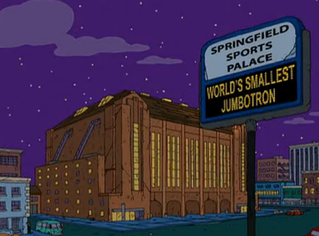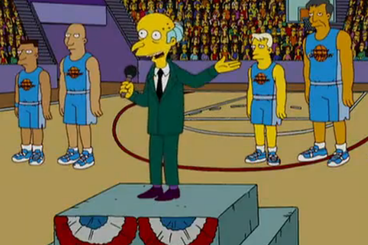By Robbie Butler - Part 3 of our entries to mark the release of Homer Economicus:The Simpsons and Economics.
In March of this year football legend David Beckham unveiled plans to build a $250 million privately-financed stadium in the port of Miami. Beckham’s decision to get involved in a US soccer franchise didn’t come as a surprise nor did the location of the potential team. What was surprising however was the announcement that any new stadium would be ‘privately’ funded.
From an economic perspective, the treatment of stadium projects is one of the most noticeable differences between sports in the US when compared to those in the UK. Fort's Sports Economics (2nd Edition Chapter 11 - The Stadium Mess), Soccernomics and the aptly named Field of Schemes all address the issue at length. Since the early 1990's more than 100 sports arenas have been constructed in the US. The bulk of these projects have received public funding. Grant (2012) suggests that the average cost of new stadium projects to the public has risen by nearly 70% over the past decade, with the mean cost at just over $240 million.
So why do cities queue up and offer to build such arenas? The logic is as follows: Major League franchises bestow prestige on American cities. Because demand for franchises consistently exceeds supply, cities are prepared to incentivise owners to move to their metropolises. Taxpayer’s money is used to fund a new stadium on the basis that jobs will be created and a subsequent windfall that will be incurred from hosting regular games. Atlanta currently faces this dilemma. Major League Baseball franchise the Atlanta Braves are set to leave their home (Turner Field) in 2017 and move to a newly constructed arena in Cobb County, 10 miles from downtown Atlanta. It is estimated the new stadium will cost a cool $672 million.

Following a disastrous start to his ownership and an exodus of fans from the arena, Dallas Mavericks owner Mark Cubin ‘advises’ Mr. Burns to “build a new arena – state of the art”. A town meeting is arranged where Lisa Simpson objects to the new stadium plans on the grounds it will destroy a local bee sanctuary. Despite a successful pitch by Lisa, Mr. Burns convinces locals to use public money to build what Mayor Quimby calls “this decadent momentum to excess” after unveiling a new NBA player to town’s people. Construction duly commences with the stadium built in six weeks.
 “Welcome to the American dream".
“Welcome to the American dream". With the Federal budget already under pressure and cuts to many key sectors of the American economy over recent years, the value of building such stadiums using public monies, must surely now be called into question. Continued tax-breaks and subsidies for franchises may be doing more harm than good. Private companies should carry private costs.
At least us Irish would never force the taxpayer to incur costs accumulated by privately owned companies…oh wait…
 RSS Feed
RSS Feed